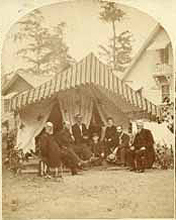Blog post by Mary Finn, Steering Committee member Posted Feb2, 2022

I love being a Quaker, and being at Chautauqua, and doing historical research. All three passions came into unity when I learned that a major Quaker organization, the Friends General Conference (FGC), had been established at Chautauqua in 1900. FGC has been described as “The most influential center of American Liberal Quakerism in the 20th century.”
The ‘History’ page on this website provides an introduction to this confluence of Quakers and Chautauqua and notes that little research has been published on the origins of the Friends General Conference, or on the relationship between Chautauqua Institution and Quakerism. Why did Bishop Vincent invite Quakers to hold their 1900 Conference at Chautauqua? Who were the Friends who accepted his invite?
There is no lack of historical resources available to answer these questions. Pulling out the threads of underlying assumptions these two groups held in common, however, is especially challenging given the complexity of these organizations and the setting in which they met—the post-Civil War, pre-intensely industrializing, newly-emerging Darwinian decades—1870 to 1900. But the shared concerns of Chautauqua Institution and the Liberal Quakers who founded FGC are there and I am intrigued by the connection of both groups to progressive/liberal ideals that increasingly came to the fore in the late 19th c.
Given the sophistication and worldliness of the FGC’s founding Friends, I was surprised by Friends’ referring to their gathering at Chautauqua as an ‘innovation.’ All previous Conferences had been held on the campus of Friends’ Colleges or Boarding Schools or Friends’ Centers, all of which were in the midst of ‘Friendly neighborhoods.’ Friends coming to mingle with Chautauquans was said to be an innovation that had caused some ‘temerity’.
Friends expressed the hope that they would not be judged by any severe standard, saying “we are a ‘plain’ people, and are met to discuss ‘plain’ matters, in a ‘plain’ way.” These Liberal Friends, however, had given up the Quietism of their predecessors and the symbols of plainness in dress and speech that had marked Quaker distinctiveness. They did not see themselves as Peculiar, but the hesitancy of ‘coming out’ so to speak, was still there.

The opening remarks by Chautauqua Institutions’ Vice-President Wilson Day assured Friends they would not “be looked at askance, or watched with a critical eye” because of their shared ties of universal friendship. The quietness of Chautauqua was emphasized as being in keeping with Quaker worship, “silence being the best form of worship,” and the ‘catholicity’ of Chautauqua meant everyone was free to worship as they wished.
But there might have been some hesitancy as well on the part of some Chautauquans who were not quite sure who these Friends were. The Drift of the Day column in the Assembly Herald however, reported on the first day of the Conference that, “The Friends are a good-looking, sensible, intellectual lot of people, just like other Chautauquans.” The hesitancy of the Friends relieved, they settled into what seemed like a typical Chautauqua experience, in a ‘strange’ but by no means unfriendly environment.
Friends announced that their meetings were open to all; hundreds of Chautauquans attended the opening session. On Day Two the program on the Friends’ Union of Philanthropic Labor was especially full of interest and the Amphitheater was filled by 10:00 am.
According to the Assembly Herald, “Friends have captured Chautauqua by their intense earnestness and enthusiasm and the practical Christianity as seen in their everyday lives…when this conference comes to a close Chautauquans will have learned many admirable things concerning the Society of Friends. From the expressions of the Friends, it is certain that they are finding more and more to admire in Chautauqua.”
The published Proceedings of the 1900 Conference at Chautauqua hoped to convey “the spiritual and intellectual uplift both given and received by our people mingling with the people at Chautauqua.”
More to come.

This is so interesting and well-done. I am planning to be at Chautauqua July 17-23 and it would be a pleasure to talk about your research. I’m booked elsewhere (before I saw this), but will check at the Quaker House.
Hope you will do more.
Marie Tyler-McGraw
Thanks for your comment. So glad to know there is another who is interested in Quakers and Chautauqua. I will be at Chautauqua for part of the week July 17-23.
I hope we can meet. I’m looking forward to hearing about your research.
Mary